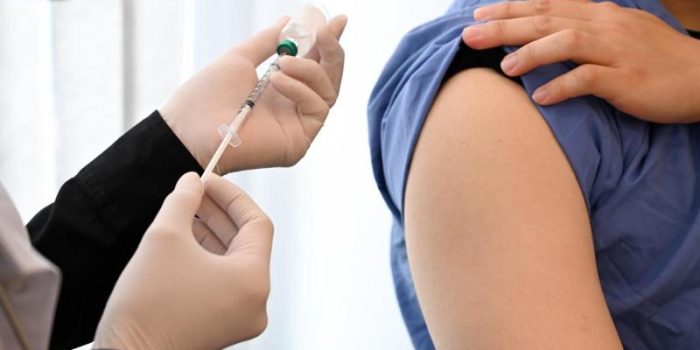The recently reconstituted Centers for Disease Control and Prevention (CDC) vaccine advisory panel took its first three votes today, recommending that Americans receive only single-dose flu shots that don’t include the preservative thimerosal, a theme long pushed by anti-vaccine groups, while also recommending Merck’s respiratory syncytial virus (RSV) monoclonal antibody preventive for infants and weighing in on the next season’s flu vaccines.
The Advisory Committee on Immunization Practices (ACIP) was expected to vote on a recommendation for the RSV preventive drug clesrovimab (Enflonsia), following its recent approval by the Food and Drug Administration (FDA), and was slated to take a routine vote to recommend vaccine formulations for the 2025-26 flu season.
The thimerosal topic, however, appeared on ACIP’s meeting agenda after Health and Human Services Secretary Robert F. Kennedy Jr. replaced ACIP’s 17 previous members with 7 new ones, some of whom are Kennedy’s close vaccine-skeptic allies.
Thimerosal topic revives anti-vaccine mantra
Used in very low amounts, thimerosal has been used since the 1930s to prevent contamination in multidose vaccine vials, and in the United States it is used only in multidose flu vaccine vials. The preservative has long been a hot-button topic of anti-vaccine groups, including one led in the past by Kennedy.
More than 40 studies over many decades, however, have found no link between thimerosal and developmental delays, though the CDC and the American Academy of Pediatrics asked manufacturers to remove it in 1999, not because it was unsafe but to bolster public confidence in vaccines.
On the eve of the meeting, Kennedy personally weighed in on X with a long post countering a media report and detailing what he views as thimerosal risks. Ahead of the meeting the CDC posted a factoid on the use of thimerosal in vaccines and on the lack of evidence for a risk, but it was quickly removed. When ACIP participants today asked why the document was removed from the CDC’s website, ACIP member Robert Malone, MD, a vaccinologist and scientist who was involved in early mRNA vaccine research, said it was because it wasn’t authorized.
A three-part vote on thimerosal in multidose flu vaccines came after a presentation from Lyn Redwood, RN, MSN, president emerita for the anti-vaccine group Children’s Health Defense, which was founded and previously chaired by Kennedy. Earlier this week, Reuters reported that one of the studies in Redwood’s presentation, posted with meeting materials a few days before the presentation, doesn’t exist. In a departure from normal ACIP practices, her presentation didn’t appear to be vetted by CDC scientists, which some health experts say is a sign that the development is designed to sow more distrust in vaccine safety.
Redwood said she was appearing before ACIP as a private citizen, another aberration to normal ACIP operating practices.
ACIP members were asked to vote on the thimerosal issue for three different groups: children ages 18 years and younger, pregnant women, and all adults. The wording for all three was that the groups should only receive seasonal flu vaccine in single-dose formulations that were free of thimerosal. In all three instances, the group voted for the recommendation.
No study has ever indicated any harm from thimerosal.
One member voted no for all three proposals, Cody Meissner, MD, who has served on both CDC and FDA vaccine advisory committees and is a professor of pediatrics at Dartmouth Geisel School of Medicine. Another member, Vicky Pebsworth, PhD, RN, research director at the National Vaccine Information Center (NVIC) abstained in all three votes due to her objections about the wording of the voting question. NVIC is an anti-vaccine organization.
Breaking with the rest of the group Meissner said thimerosal is an old issue that has been addressed in the past. “No study has ever indicated any harm from thimerosal,” he said, pointing out that ACIP generally makes its recommendations based on scientific evidence and that—due to no evidence of harm—the FDA has not removed the additive.
Meissner also said he worried that discouraging the use of multidose vials could increase the cost of vaccination and limit access for some groups. He also raised concerns about the message the ACIP recommendation would send to countries where the use of multidose flu vaccine formulations is more common. The FDA estimates that about 4% of the US flu vaccine supply is available as multidose vials.
Several nonvoting ACIP nonvoting liaison members also spoke out against the recommendation, asking for CDC scientists to weigh in and raising concerns about the implications for pandemic flu vaccines, typically available initially in a multidose formulation.
Most of the other members, though, were swayed by a theoretical risk and concerns about cumulative exposure to mercury.
Votes on seasonal flu vaccines, RSV monoclonal
In a more routine vote, the committee reaffirmed the ACIP recommendation that those ages 6 months and older be vaccinated against flu each year, except for those who have contraindications. The recommendation, which passed with six yes votes and one abstention, included updated vaccine strains for the 2025-26 season, as recommended by the FDA in March.
It also covers two new changes to flu vaccine for upcoming US season, including the live attenuated influenza vaccine (FluMist) for self- or caregiver administration, and a wider age indication for the Flublok cell-based vaccine, which was recently approved for use in children as young as 9 years old.
Also, by a narrower margin, the group recommended clesrovimab for newborns and infants entering their first RSV season. There were five yes votes, and two voted no. The FDA approved clesrovimab earlier this month, bringing a second RSV monoclonal preventive for babies to the US market. In a companion vote to recommend clesrovimab’s inclusion in the CDC’s Vaccines for Children program, the measure passed unanimously.
Committee to weigh MMRV vaccine later
In other developments, the group briefly discussed another topic that is a priority for vaccine critics: the measles, mumps, rubella, and varicella (MMRV) vaccine in children younger than 5 years old.
The live-attenuated product is typically administered to children ages 12 months to 12 years old. The first dose is usually given between 12 and 15 months, with the second dose given between 4 to 6 years of age. The vaccine carries a slightly higher risk of febrile seizures when given as the first dose compared with separate measles, mumps, and rubella (MMR) and varicella vaccines, especially among younger children.
ACIP Chair Martin Kulldorff, PhD,a statistician and epidemiologist formerly at Harvard University, said though the group didn’t have time to discuss and vote on the matter at the current meeting, he aired a proposed recommendation and said the committee will take up the issue at a future meeting. The proposed recommendation said if there’s a safe equally effective alternative, the MMRV vaccine should not be administered to children younger than 47 months.
At yesterday’s session, he said ACIP will establish two new working groups, both hot topics among vaccine critics. One will evaluate the cumulative effects of vaccines of the CDC’s recommended schedule for children and adolescents. The other will examine vaccines that have been in use for more than 7 years, which will likely include hepatitis B vaccination at birth and the use of MMRV vaccine in young children.













